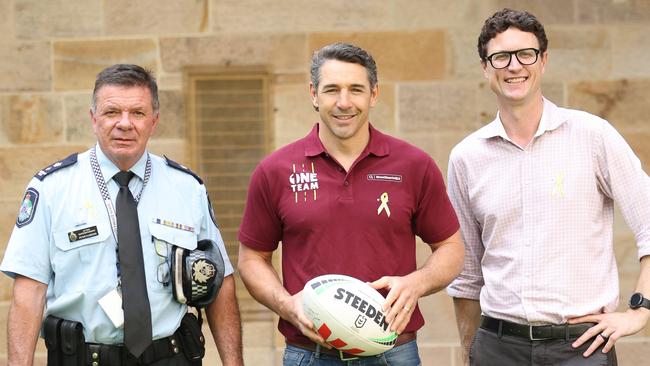Editorial: Looking out for each other the solution to road toll
Queensland’s road toll is on track this year to be the worst in more than a decade, writes the editor.

Opinion
Don't miss out on the headlines from Opinion. Followed categories will be added to My News.
There is a truism that, when massive events occur, we humans tend to over-estimate their impact in the short-term and underestimate them over the long-term.
So it has come to pass with the Covid-19 pandemic of 2020-2022, with its impact on our world and our way of life hugely more significant in all kinds of ways than just a virus that forced us into lockdowns until a vaccine was created. From the cost-of-living crisis to mental health issues and distrust in governments, Covid-19 has left its mark in so many ways that we are only now starting to fully realise.
The latest is the revelation that Covid-19 has also left its mark even on Queensland’s road toll – which is on track this year to be the worst in more than a decade.
So far this year, 188 people have died on the state’s roads, 6.8 per cent up on last year. At the current rate, that means we are on track to hit 300 deaths by December 31.
The last time that happened was way back in 2009, when 331 people died on our roads.
And, according to Queensland Police Service Road Policing Group Acting Superintendent Peter Flanders, Covid-19 is partly to blame – because the pandemic has made people more selfish on the roads.
He explained: “People talk about a hangover from Covid where we all became a little bit more selfish. That’s certainly evident on the road, there’s no doubt about that.”
In other words, human behaviour is getting in the way of the now-decades-long and largely successful efforts to reduce our road toll, which hit an appalling peak of 638 lives lost in 1973.
Back then, Queensland’s population was barely two million people. Today, it’s 5.6 million, which means if we’d kept killing ourselves at the same rate as 50 years ago, our annual road toll would be closer to 2000 deaths a year.
But it is not, thanks to a multitude of approaches to road safety – from better roads and safer cars to the simple fact that seatbelts are now compulsory and random breath testing works as a deterrent. And things do, generally, continue to improve. Based on Queensland’s population growth since 2009, last year’s road toll of 276 would have been the per capita equivalent, in 2009 terms, of 221 deaths.
A toll of 300 this year – as tragic as it would be that we would be creeping back towards that tragic average of one death every single day – would equate in per capita terms to 237 deaths in 2009.
But in pre-Covid-19 2019, that same number was 200. Things are getting worse. And beyond that, every road death is a tragedy. Surely our goal should be that not one person loses their life while driving on our roads.
Technology, awareness and of course tougher law enforcement do make a difference over time. But our quest for zero road deaths also requires all road users to treat each other with respect and courtesy – to not be selfish. As Superintendent Flanders puts it, “At the end of the day, it’s about looking after one another and if we do that, we will drive down the road toll.”
He describes the road safety as a “community health problem where we all need to look after our own health, and frankly, Queenslanders are not doing that at the moment”.
Covid-19 may indeed have made us more selfish and cautious, and even suspicious of others. But what we also saw during the pandemic was that most people, most of the time, did the right thing.
We wore the masks and used sanitisers and isolated ourselves when we were sick – for reasons of both self-protection and some sense of public duty. We didn’t want to be the one spreading the virus.
Some of us might have become sceptical of the motives of our political masters but, collectively, we acted with enormous responsibility, founded on the recognition that were we all in this together.
And so, if road safety is indeed a community health problem, we should be able to do what we did during the pandemic – not only look out for ourselves but also our fellow road users.
LOYALTY? WHAT’S THAT?
It matters only a little that former premier Annastacia Palaszczuk tried to put the genie back in the bottle over her refusal to endorse her successor Steven Miles early yesterday by later messaging her support of him to The Courier-Mail’s state political editor.
The damage was already done – because it is shocking that a person who owes their entire livelihood to the great Australian Labor Party chose to respond to the simple question of whether she wanted to give Premier Miles an endorsement by saying: “Look, thanks for coming today, I’ve got to keep going”.
A simple “Yes” would have taken one-13th of the time – and she could have indeed then kept going.
Ms Palaszczuk was a fortnight ago gifted a $107,000-a-year part-time gig on the Australia Post board by Labor federal Communications Michelle Rowland. The post had been held by former Liberal Party federal director Tony Nutt – and so it is one of the sadly many taxpayer-funded jobs treated by both sides of politics as a golden handshake for someone’s loyalty to the party.
Many true believers will be angry Ms Palaszczuk returned that favour with her bizarre reaction yesterday.
Responsibility for election comment is taken by Chris Jones, corner of Mayne Rd & Campbell St, Bowen Hills, Qld 4006. Printed and published by NEWSQUEENSLAND (ACN 009 661 778). Contact details here


